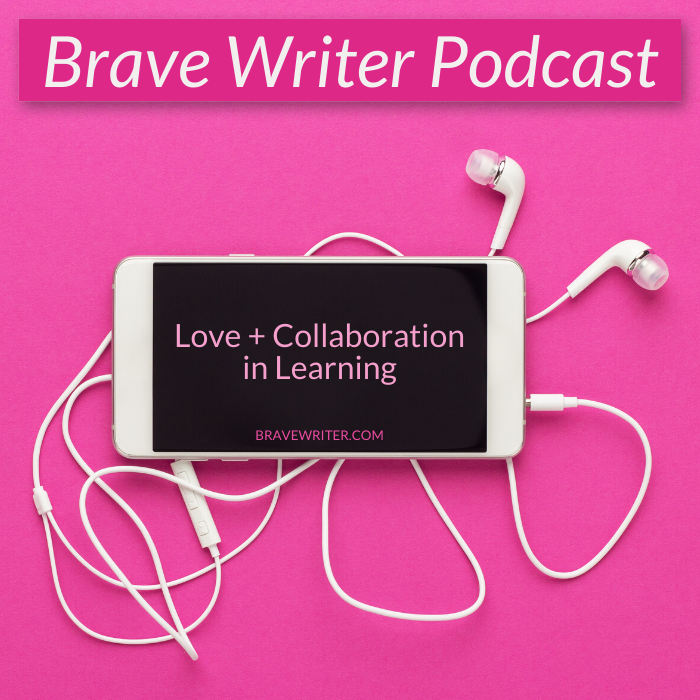Podcast: Love + Collaboration

You might be coming to the Brave Writer podcast to learn about:
- teaching six kids six different subjects,
- dealing with cantankerous children,
- or sharing your love of reading with a kid who doesn’t seem interested yet.
But if you want to achieve any of those things, you need to consider a few things about love.
Listen to the Podcast
Show Notes
Love: A View From Different Angles
Julie compares our expectations around love to that moment when you have a bad itch on your back that you can’t reach. You’re sitting on the couch, you contort your body as you move forward, and your partner starts to scratch your back. It can be so difficult to get them to scratch the right spot without just grabbing their arm and moving it to the right spot.
A part of you imagines that the person who loves you so much should just know where to scratch your itch, and if we’re honest, this is often what it feels like to be in love; it’s that irrational desire to be merged, to be known, to have your needs met. We endeavor to find someone who is willing to divide the burden of being ourselves, splitting all of our tasks and emotional needs with the person who loves us.
“We want love to help us with our messy imperfections without any judgement,” Julie says. “But that kind of love is a lot of pressure to put on someone at all times.”
When we’re forced to confront that this “I know you better than you know yourself” kind of love will inevitably fall short of our wants, one polarizing word will inevitably come up these days: self-love.
When people talk about self-love, what they are really saying is that no one can know you like you know yourself. This isn’t just empty affirmations in a bathroom mirror. Julie sees self-love as the willingness to pause, discover what you need, and then muster the courage necessary to admit it and do something about it.
Some will say that serving others is the way to fill your own tank. Others will suggest that you can choose to act loving, even if you don’t feel it, and the loving feelings will eventually follow. “But I just don’t agree,” Julie says. “When I hit the brick wall of my emotional depletion, just being urged to serve others does not help me recover loving feelings for them or for me. When we are starved for love, affection, romance, caretaking, and understanding, that hunger doesn’t go away by spending more love on others.”
Another way of viewing love is as a verb, as an action. It’s doing the dishes without being asked. It’s that affectionate embrace and kiss when you don’t expect it. It’s being surprised with a treat you love at the end of the day.
All of these things matter, but is dish-washing love enough? Are acts of service on behalf of the other person enough to sustain the power and need-meeting that love is designed to provide? Julie doesn’t think so.
When we talk about love as an action, we start imagining that we know what is best for the other person. We take charge of that person and call it love, then we execute plans for that person — plans that are often painful, uncomfortable, or not pleasurable — and we tell them that this is what love looks like. “We skew the meaning of the word love and try to get everyone to agree that the hunger you have to feel loved is unnecessary for a meaningful love; that if you would just be logical and accept my act of service or responsible care version of love as love for you, you will be happy enough.”
If you’ve ever been the object of good-for-you love, you’ll know what Julie means here. But if someone has to persuade you that what they did for you is love, you will certainly not feel it as loving.
Love in Our Home, Love in Our Schools
In our families, love is the context and the goal — but we sometimes forget to pay attention to what is experienced as love. We spend so much time offering responsible care as love to our kids, then we are shocked when that ease and passion dissipates from our relationship.
“We set priorities that are about well-being, rather than the experience of being known and feeling loved.” And in homeschooling, I think most of us have fallen into this trap of offering responsible care instead of love. It can feel easy. In many ways, it feels more in line with traditional schooling models. But the first thing you feel when someone sees you as their responsibility is a loss of love.
And didn’t we start homeschooling because we wanted something different than that? Wasn’t our family, and our relationship with our family, a huge part of that decision?
“You don’t fall in love with people for who they become. The falling in love, the romance, the affection, the bondedness, the intimacy comes from being more fully known as we already are,” Julie says. “If we put the felt experience of love at the center of learning, however, how does that change how we educate?”
Resources
- Download a FREE transcript of this episode.
- Get Started with Brave Writer by watching Julie’s brand new video series that helps you understand how to use the program at bravewriter.com/getting-started. Each video is only a couple minutes long and will give you the necessary information to determine which level and which products are just right for your kids. If you have further questions, reach out to our trained staff for personal advice and help: [email protected]
- Sign up for the Brave Writer Newsletter here.
Connect with Julie:
- Instagram: instagram.com/juliebravewriter
- Twitter: twitter.com/bravewriter
- Facebook: facebook.com/bravewriter


















